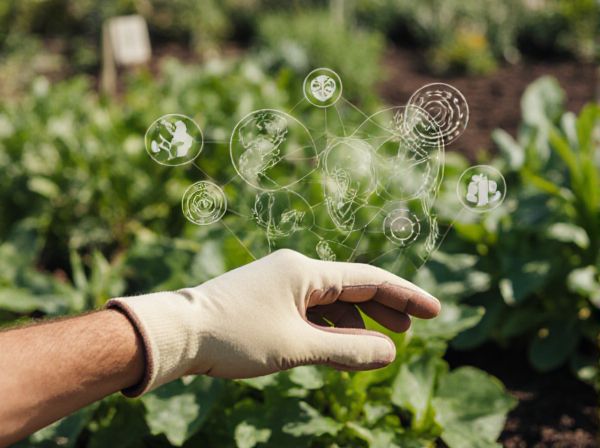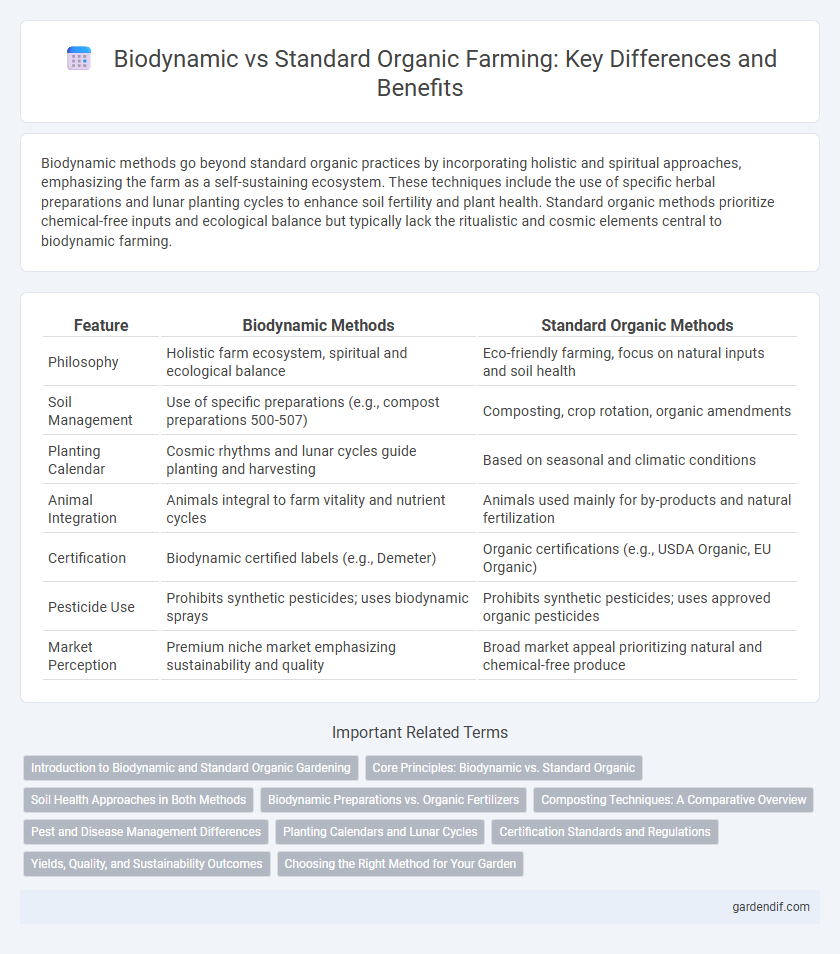
Biodynamic methods vs standard organic methods Illustration
Biodynamic methods go beyond standard organic practices by incorporating holistic and spiritual approaches, emphasizing the farm as a self-sustaining ecosystem. These techniques include the use of specific herbal preparations and lunar planting cycles to enhance soil fertility and plant health. Standard organic methods prioritize chemical-free inputs and ecological balance but typically lack the ritualistic and cosmic elements central to biodynamic farming.
Table of Comparison
| Feature | Biodynamic Methods | Standard Organic Methods |
|---|---|---|
| Philosophy | Holistic farm ecosystem, spiritual and ecological balance | Eco-friendly farming, focus on natural inputs and soil health |
| Soil Management | Use of specific preparations (e.g., compost preparations 500-507) | Composting, crop rotation, organic amendments |
| Planting Calendar | Cosmic rhythms and lunar cycles guide planting and harvesting | Based on seasonal and climatic conditions |
| Animal Integration | Animals integral to farm vitality and nutrient cycles | Animals used mainly for by-products and natural fertilization |
| Certification | Biodynamic certified labels (e.g., Demeter) | Organic certifications (e.g., USDA Organic, EU Organic) |
| Pesticide Use | Prohibits synthetic pesticides; uses biodynamic sprays | Prohibits synthetic pesticides; uses approved organic pesticides |
| Market Perception | Premium niche market emphasizing sustainability and quality | Broad market appeal prioritizing natural and chemical-free produce |
Introduction to Biodynamic and Standard Organic Gardening
Biodynamic gardening incorporates holistic, spiritual principles with organic practices, emphasizing soil health, crop diversity, and lunar planting cycles to promote ecosystem balance. Standard organic gardening focuses on avoiding synthetic chemicals, using natural fertilizers, and maintaining soil fertility through composting and crop rotation. Both methods prioritize sustainability, but biodynamic approaches integrate unique preparations and cosmic rhythms to enhance plant vitality and soil quality.
Core Principles: Biodynamic vs. Standard Organic
Biodynamic methods emphasize a holistic farm ecosystem based on lunar and cosmic rhythms, integrating soil fertility, plant growth, and animal health into a unified system, contrasting with standard organic methods that focus primarily on avoiding synthetic chemicals and promoting natural inputs. Biodynamics uses specific preparations and rituals to enhance soil vitality and plant resilience, fostering a self-sustaining, closed-loop environment, whereas standard organic practices rely more on external organic amendments and certified inputs. Both systems prioritize ecological balance and sustainability, but biodynamics incorporates spiritual and astrological factors that extend beyond the purely scientific approach of standard organic farming.
Soil Health Approaches in Both Methods
Biodynamic methods prioritize soil health by enhancing microbial life through the use of herbal preparations and compost teas, fostering a self-sustaining ecosystem that integrates lunar and astrological cycles. Standard organic methods emphasize soil fertility by avoiding synthetic chemicals and incorporating crop rotation, green manures, and organic amendments to maintain nutrient balance. Both approaches aim to improve soil structure and nutrient availability but biodynamic farming uniquely blends spiritual and ecological elements to optimize soil vitality.
Biodynamic Preparations vs. Organic Fertilizers
Biodynamic preparations such as horn manure (Preparation 500) and horn silica (Preparation 501) are crafted from natural materials and undergo specific fermentation processes, enhancing soil vitality and microbial diversity beyond what standard organic fertilizers typically achieve. Organic fertilizers primarily supply essential nutrients like nitrogen, phosphorus, and potassium but lack the subtle energetic qualities and holistic soil conditioning found in biodynamic preparations. These distinct qualities in biodynamic methods promote greater plant resilience and balanced ecosystem interactions compared to conventional organic fertilization practices.
Composting Techniques: A Comparative Overview
Biodynamic composting techniques incorporate specific herbal preparations and lunar calendar timings to enhance microbial activity and soil vitality, distinguishing them from standard organic composting which primarily relies on temperature and moisture regulation. The use of biodynamic preparations such as horn manure (Preparation 500) and horn silica (Preparation 501) stimulates nutrient cycling and humus formation more intensively than typical organic methods. These specialized practices contribute to improved soil structure and plant health, supporting the holistic ecosystem approach unique to biodynamic agriculture.
Pest and Disease Management Differences
Biodynamic methods enhance pest and disease management by using preparatory herbal sprays and encouraging biodiversity to strengthen soil and plant health, creating resilient ecosystems less prone to infestations. Standard organic methods primarily rely on approved biological pesticides and crop rotation to control pests and diseases, focusing on minimizing chemical inputs while maintaining soil fertility. The holistic approach of biodynamics integrates cosmic rhythms and soil vitality, aiming for balanced agroecosystems that reduce pest outbreaks naturally.
Planting Calendars and Lunar Cycles
Biodynamic methods integrate planting calendars based on lunar cycles, aligning sowing and harvesting activities with moon phases to enhance plant growth and soil vitality. Standard organic methods emphasize soil health and ecological balance but typically do not incorporate lunar rhythms into scheduling. Research suggests that synchronizing agricultural practices with lunar cycles in biodynamics may improve crop resilience and nutrient uptake compared to conventional organic approaches.
Certification Standards and Regulations
Biodynamic methods adhere to rigorous certification standards established by organizations like Demeter International, which mandate holistic farm management practices integrating spiritual and ecological principles, surpassing conventional organic regulations. Standard organic methods primarily comply with USDA Organic or EU Organic certifications, emphasizing the exclusion of synthetic chemicals and GMOs but often lacking the comprehensive ecological and cosmic cycle considerations found in biodynamics. Regulatory frameworks for biodynamics require farmers to implement specific preparations and lunar calendar planting schedules, ensuring a deeper alignment with natural rhythms not typically enforced in standard organic certifications.
Yields, Quality, and Sustainability Outcomes
Biodynamic methods often result in slightly lower yields compared to standard organic practices due to their emphasis on soil health and ecosystem balance. However, the quality of biodynamic produce is typically superior, with enhanced nutrient density and flavor complexity attributed to holistic soil and plant care. Sustainability outcomes are stronger in biodynamic systems as they integrate cosmic rhythms and biodiverse cover crops, promoting long-term soil vitality and ecosystem resilience beyond conventional organic standards.
Choosing the Right Method for Your Garden
Biodynamic methods offer a holistic approach by treating the garden as a self-sustaining ecosystem, using natural preparations and lunar cycles to enhance soil fertility and plant health, whereas standard organic methods emphasize eliminating synthetic chemicals and relying on compost and organic fertilizers. Choosing the right method depends on your garden's size, goals, and commitment to maintaining ecosystem balance, as biodynamic practices require more specialized knowledge and attentiveness. Prioritize soil health and biodiversity to achieve sustainable growth, whether adopting biodynamic preparations or well-managed organic practices.
Biodynamic methods vs standard organic methods Infographic

 gardendif.com
gardendif.com